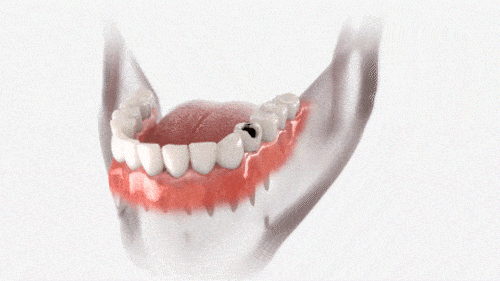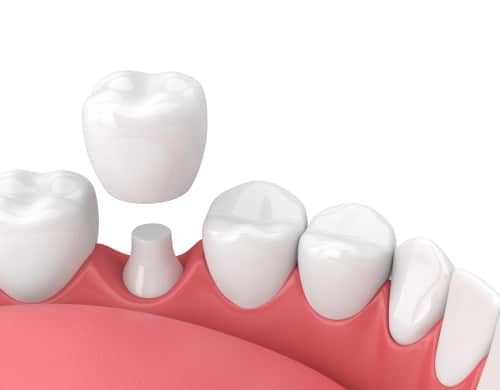Dental Crowns in Austin, TX
If your tooth is damaged, you may experience pain, sensitivity, or tenderness. You might also spot a crack or break. In these cases, we may recommend a dental crown to restore and protect your tooth. Dental crowns are commonly used in dental offices to prevent further damage to impaired teeth. From cracks and decay to wear and discoloration, crowns can address a variety of restorative and cosmetic needs.
Since 2007, the compassionate team at Aspire Dental has been dedicated to helping our patients achieve optimal oral health. Driven by a patient-centered approach, we believe everyone deserves a beautiful, functional smile that meets their dental needs and goals. If you need a dental crown, you’re not alone. Single dental crowns are the most common restorative procedure in dentistry today.
Understanding Dental Crowns
A dental crown is a “cap” that encompasses the entire surface of your tooth, completely concealing it. These tooth-shaped coverings are used to restore teeth that are:
- Cracked or broken
- Worn down (from bruxism or other causes)
- Significantly decayed
- Misshapen
- Discolored
Additionally, crowns protect teeth that have been:
- Treated with a root canal
- Restored with a large dental filling
- Replaced with a dental implant
While the primary purpose of dental crowns is restorative, they can also be used cosmetically to enhance the look of your teeth. Crowns improve the shape, size, and function of teeth, offering both functional and aesthetic improvements. However, if your main concern is cosmetic, dental veneers may be a more suitable treatment.
Types of Dental Crowns
Dental crowns are made from various materials to meet patients’ unique needs and preferences. Materials like metal, resin, porcelain, and other ceramics used in dental crowns have different advantages and disadvantages. For example, some materials are stronger, providing more stability and durability. These options, however, are typically more expensive.
Some materials look more natural and are often used to cap front teeth or those that are visible when you smile. Tooth-colored crowns, made from a ceramic material or composite resin, blend seamlessly with your teeth like composite fillings. However, fillings are used for minor to moderate cavities, whereas crowns are for larger ones.
Crowns are also used to support dental bridges—a dental appliance that replaces one or more missing teeth in a row. This type of restoration has crowns on each end that attach to healthy natural teeth. A fake tooth or teeth sit between the crowns to “bridge” the gap.
Mini Implant-Supported Crowns
Our goal is to restore the health of your natural teeth whenever possible. However, if a tooth is too damaged to be capped with a crown, we can extract the tooth and replace it with a mini dental implant. Mini dental implants are prosthetic tooth roots made from durable titanium. We screw these into your jawbone for stability that can last a lifetime. Mini implants are a smaller alternative to traditional dental implants. Both support a restoration like a crown, bridge, or denture, but mini implants offer significant advantages:
- Because they are half the size of conventional implants, mini implants are an excellent choice for individuals with bone loss.
- We can place mini implants in a single office visit due to their narrow size and the efficient placement technique we employ.
- Mini implants can be immediately loaded, meaning you will see immediate results from your tooth replacement procedure.
- The procedure for placing mini implants is minimally invasive, ensuring a comfortable experience that allows you to recover quickly.
- Mini implants are more affordable, cutting the cost of traditional implants in half.
If your tooth is too damaged to be treated with a traditional dental crown, we can extract the tooth and replace it with a mini implant and natural-looking artificial crown.
The Two-Step Process
First Visit
The procedure for dental crowns typically involves two visits. During your initial visit, we will prepare your tooth by removing some enamel. By shaping the tooth, we create a perfect fit for your crown. We will use local anesthesia to keep you comfortable during this step, so you shouldn’t feel any pain. Then, we will take impressions for your custom crown, which is crafted by dental lab technicians in about two weeks. In the meantime, we’ll place a temporary crown to safeguard your tooth.
Second Visit
When you return for your second visit, we will remove the temporary crown and check the custom crown’s fit, shape, size, and overall appearance. We will also check to make sure your bite is properly aligned. Then, using a strong adhesive, we will bond the crown to your tooth. Because local anesthesia numbs the tooth and gums, the crown placement is virtually painless, and most people can immediately return to work or school following their procedure.
However, getting used to the new crown may take a few days. If you experience soreness during this period, over-the-counter pain relievers like ibuprofen can help. Minor sensitivity may linger for a couple of weeks, but this is normal.
Caring for Crowns
With proper care and maintenance, dental crowns can last for 30 years. However, the lifespan of a crown depends on the materials used and the care measures taken.
Proper care of dental crowns is essential to ensure their longevity and maintain your oral health. To keep your crown in optimal condition, follow standard oral health guidelines:
- Brush twice per day with fluoride toothpaste and a soft-bristle brush.
- Floss once per day to clear debris from between your teeth.
- Rinse with antimicrobial mouthwash to prevent plaque buildup.
- Use a nightguard if you grind or clench your teeth at night.
- Maintain regular checkups at Aspire Dental. We will check for signs of wear or damage and address any issues promptly.

To prevent damage, you should also avoid certain foods that could crack, loosen, or dislodge the crown. Foods to avoid include ice cubes, hard nuts or seeds, popcorn, and sticky or chewy foods and candies. Additionally, limiting sugary and acidic foods and beverages can prevent decay and gum problems around the crown.
Diligent care measures ensure your crown remains strong and functional for many years. However, if you notice damage, your crown should be replaced.
Dental Crown Costs
The overall cost of a dental crown depends on the material used, the number of teeth treated, and whether additional procedures are needed, such as an extraction before a mini dental implant is placed.
Crowns are essential for your long-term oral health when used to restore damaged teeth. As a result, insurance often covers a crown deemed medically necessary. However, the covered amount depends on your particular plan. We’ll help you navigate your policy to maximize your benefits.
For patients seeking financial assistance, we partner with several third-party lenders to help you afford out-of-pocket expenses. These companies offer flexible financing plans, allowing you to pay for dental care with manageable monthly payments.
At Aspire Dental, we believe that everyone should have access to high-quality dental care. We will gladly discuss your financing options before your procedure to ensure that cost is not a barrier to treatment.
Safeguard Your Smile with Dental Crowns
Dental crowns restore function to damaged teeth, serving as a protective barrier and providing enhanced stability. If you have a tooth that is decayed, worn, broken, cracked, or otherwise at risk, a dental crown can help.
At Aspire Dental, we are committed to providing high-quality dentistry to maintain your oral health and well-being. For over 15 years, Dr. Hall and Dr. McNeil have proudly served patients in Austin, TX. If you are ready to improve your oral health, contact us today to schedule a consultation and learn if dental crowns are right for you.
